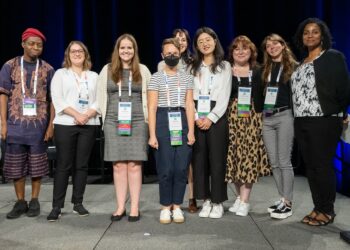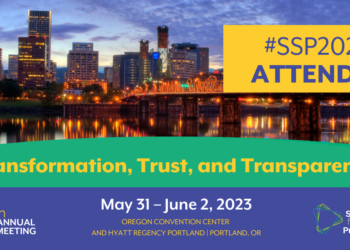Alongside our burgeoning tradition of asking the SSP Fellows for their impressions of the Annual SSP meeting, we’ve been asking other constituencies for their insights/feedback/highlights too. The Chefs themselves have chipped in regularly, in 2017 it was Librarians, and in 2018 and 2022 we invited feedback from anyone who cared to chime in (aka Delegates or the Community).
This year we passed the mic over to the Vendor community:

PAUL KILLORAN, EX ORDO
Nothing can replace that magic that is created when people meet. My lasting memory from SSP is a feeling of warmth from belonging to this community and how open everybody is to the exchange of new ideas. We’re very fortunate to have this space to converse and the opportunity to meet in person. It was inspiring to be surrounded by people who care so deeply about their purpose and their mission.
The big news from Ex Ordo at SSP was the announcement of our $3m investment to enhance our scholarly conference platform. We were particularly proud to share this news exclusively during our session at SSP given that our investors are leading figures within the scholarly communications industry including Paul Peters (former CEO of Hindawi), Ahmed Hindawi and Nagwa Abdelmottaleb (co-founders of Hindawi), Sven Fund (MD of Reviewer Credits), and James Douglas (MD of Morgan Healey). We plan to use the funding to further develop our powerful scholarly events platform, build out flexible integrations with other vendors, and expand customer-facing teams, enabling enhanced support for scholarly societies and their events programs. It marks the beginning of a new chapter in the Ex Ordo journey and I was honored to be able to celebrate this new chapter with the community at SSP.
I think it’s no surprise that the big topic on everyone’s lips this year was the emergence of AI and the challenges this will bring to scholarly integrity. It’s been breathtaking to witness the speed and accessibility of AI development (LLMs in particular) over the past few months and to be able to recognize it as a defining moment in history. Equally, it’s been astonishing to contrast the speed of AI innovation with the lack of speed of scholarly tech innovation and how our industry remains largely reliant on outdated technology.
The big takeaway for us and the message we heard consistently from our customers at our booth was; we have limited resources and bandwidth, our tools are inefficient and don’t talk to each other, and all the while our community has greater expectations around engagement and the accessibility of our content.
The pandemic plunged the scholarly events industry into a period of chaos and great experimentation. The promise of virtual events replacing physical events did not fully materialize, but instead presented the challenge of delivering engaging and cost-effective hybrid events whilst balancing societies’ limited time and resources. What we heard is that the industry needs help to grapple with these challenges and so as we packed our bags and made our way back home to Ireland, we left with a clear mission: Solve the bandwidth and integration problems for scholarly events. Onwards!
TONY ALVES, HIGHWIRE PRESS
One of the wonderful things about SSP is the friendly and smart people that make up the SSP community. This year I spent a lot of time introducing my colleague, Anju Sah, to clients, friends, and fellow vendors. Anju, who works for HighWire’s parent company MPS, came over from our Bangalore office to attend the meeting. I wanted to be sure she had a great experience, and it was truly heartwarming to see how friendly everyone was. Anju remarked that clearly, we are a close-knit industry – everyone seems to know everyone.
Another wonderful thing about SSP is the collaborative nature of the vendor ecosystem. I particularly appreciated the Industry Breakout Sessions, where I learned about the challenges of working with AI, how to best communicate with researchers in China, how preprint peer review can enhance traditional peer review, and how data and analytics are being used by publishers and editors. Sharing problems and solutions, even among competitors, strengthens the SSP community and helps us build a stronger scholarly publishing industry together.
One of the highlights for me was the chance to listen to the keynote address given by Dr. Elizabeth Bik, a well-known and highly respected research integrity advocate and activist. Known for her image manipulation “sleuthing”, Dr. Bik provided a wide-ranging discussion of research fraud, and how it damages the public’s trust in science. She had a short wish list for publishers, 1. Use “expression of concern” more often, 2. Make use of the PubPeer dashboard, and 3. Provide her with legal access to paywalled papers so that she can unearth more fraud. I am a big fan of Dr. Bik’s work through my affiliation with STM’s Research Integrity Hub project. It was a great joy to bump into her at the Portland Japanese Garden on Saturday, where she gave me a short lesson in Japanese garden design, pointing out the use of artful patterns of color and texture that, to me, seemed mostly random.
The big take away from this year’s SSP is that AI is not just dominating the discussion, it IS the discussion. AI affects every part of the scholarly publishing value chain, from content creation, to QA and content enhancement tools, to fraud detection, to how the content gets delivered to the reader. AI affects legal issues like copyright, it impacts our workforce, and it permeates every blog and newsletter. Is it hype or is it a sea change? I’m looking forward to finding out.
Of course, the regular sessions were great, the receptions were a blast, and the panels and debates were a lot of fun too!
TIM VINES, DATASEER
SSP this year was quite the event for both DataSeer and Tim (our Founder). We had both a booth, an Industry Breakout session, and Tim presented as part of a Thursday session (on adopting Data Sharing policies) and as part of the Plenary Debate on the final day. Among all that, we met up with all sorts of people and talked about the things that fire us up, i.e., open science and (in Tim’s case) peer review workflows. We also were able to introduce some DataSeer staff to the community – our Growth Engineer Eva Bramwell, and our new Director of Partnerships Adrian Stanley – and give out some cake.
The meeting theme (“Transformation, Trust, and Transparency”, Oxford comma included!) was also a good fit for us because it got people thinking and talking about how to promote trust in research at scale, which AI tools are in a strong position to tackle. My biggest regret is not finding more food trucks around Portland – there’s always so much going on in the conference itself that making time to just wander around is a challenge…
MARJORIE HLAVA & HEATHER KOTUKA, ACCESS INNOVATIONS
First, we have to thank the SSP staff. They are always responsive, helpful, and friendly. There are so many little details to address when exhibiting and it’s reassuring that the staff is always there with the right answer and a cheerful reply – even if you’ve asked them the same thing three times. We love working with them.
Second, a big shout out to the cast of “Metadata: The Musical”. It might have been the most exciting session. This was an “in crowd” comedy attended by nearly half of all attendees who laughed throughout and sang along with the nerdy, campy lyrics with great delight. Congratulations to SSP for hosting the skit and to the performers, organizers, and, of course, to the writers — it shows a mature group that can laugh at themselves. All kidding aside, we hope you got the message – metadata is everywhere, at least it should be, and how can we recognize it and incorporate it in our lives? Everybody! We all live in an information world…
Third, people attending onsite were glad to convene in person and talk. The connections we make or strengthen at SSP help us be better, both professionally and personally. We had several purely personal conversations that we will remember for a long time – despite maybe forgetting someone’s name (temporarily). Networking doesn’t end with a business deal every time.
Speaking of conversations, we talked a lot with attendees at our exhibit booth, some with planned meet up times and some serendipitous. Both are valuable – connecting with our current clients in person allows far better interaction than phone calls or video conferencing. It’s more relaxed and flows more freely. Vendors continue to be a collaborative bunch seeking partnerships and sharing information and leads when things are outside their own area of expertise.
The meeting buzz seemed to be the threat of ChatGPT, the challenges of the continued interference in publishing by the government, the Nelson Memo, and the European Union’s latest requirements. It feels like the bureaucrats really have no idea what the publishing process contributes to the scholarly record or why it is important to keep publishers around to ensure research integrity. Further awareness and education campaigns are warranted.
We look forward to seeing you all in Boston!
SAMANTHA GREEN, MORRESSIER
The annual meeting in Portland served as a clear indication that scholarly publishing is currently at a crucial turning point. Open access has long dominated discussions, session titles, and industry innovation. Although open access remains prominent, this year there was a notable increase in conversations regarding research integrity. In fact, these two topics are closely intertwined. The business models supporting open access publishing have placed additional strain on publishing’s scalability and have, at times, exacerbated potential challenges concerning research integrity. Additionally, open access publishing has often faced criticism regarding the quality and integrity of its content. However, this year, there was a noticeable shift in the conversation as publishers, editors, and others began emphasizing transparency and research integrity.
Throughout the three-day event in Portland, visitors to our booth were primarily seeking dependable support to ensure integrity across their portfolios. They aimed to save time during peer review and add an extra layer of oversight and evaluation to their publishing workflow. The question on everyone’s mind was how to increase publication output while maintaining high standards of quality and integrity.
From a technological standpoint, there exists significant potential for enhancing this delicate balance: publishing faster, improving quality, and increasing output. As we engaged in conversations with booth visitors about the future of research integrity and the prospect of supporting the peer review process through automated integrity services, we witnessed a great deal of curiosity and even relief. The forthcoming era in scholarly publishing will witness new partnerships and collaborations between technology and traditional publishers. These partnerships will involve the development of novel services and the utilization of the latest APIs and integrations to expedite the publishing process.
During the event, we introduced our Research Integrity Suite and were honored to receive the People’s Choice Award (a heartfelt thank you to all who voted for us). We returned with valuable insights from numerous sessions focused on research integrity and infrastructure, which will enable us to further enhance our solution for publishers and editorial teams, enabling them to publish with confidence. One of the most intriguing lessons learned was the necessity for publishers themselves to adopt transparency in order to enhance the transparency and integrity of the scientific record. This year, there was a greater willingness to openly share challenges and common struggles than in previous years. This spirit of collaboration and openness will be instrumental in effectively addressing research integrity challenges as an industry.
BRIAN CODY, SCHOLASTICA
Many thanks to The Scholarly Kitchen for doing this roundup!
We had a lot of visitors to the Scholastica booth this year, and from chatting with attendees, there were a couple of clear themes we heard:
- Challenges around open access (OA) business models. Across publishers of various sizes, we heard variations of comments like “we’re going to launch a new open access journal and are going to try a different software/vendor setup to keep costs down…” and “we have a journal we’re going to try transitioning to open access, and figuring out how to bill APCs is a big challenge.” We heard concerns about equitable APC models (including how much manual work would be involved in verifying and tracking payments), challenges around APC waiver development and implementation, and generally concerns about whether OA budget projections would, in any way, resemble reality a year or two down the road. There seemed to be a strong acceptance that pressure to support OA was no longer something on the horizon but rather something that had arrived. But many are still experiencing challenges in responding to that pressure and feel they have to figure it out for themselves.
- In-person still feels valuable. We heard from many booth visitors how nice it was to see people in person again. While maybe not quite at the euphoric level of the first masked hybrid in person/remote conferences of 2022, where people were coming out of quarantine and celebrating travel again, at SSP 2023, we heard attendees lauding the benefits of in-person events, including the ability to learn about products in a 2-minute conversation without having to schedule an hour call, the freedom of listening to sessions without the allure of your email or company chat being but a click away, and the serendipity of running into someone and brainstorming a new project idea. One key theme was appreciation for the break from routine work to think about trends and get excited about upcoming projects.
- AI, oh my! There was a steady stream of references to AI and humorous allusions to AI being able to solve any problem – or add a whole host of new problems for publishers. There was a sense that AI was the most important topic at the conference, and perhaps as clear a sense that the other shoe had yet to drop, that the scale of AI problems had yet to hit full-force. Similarly, there was a shared excitement around the potential benefit of adding AI to workflows and hope that AI-powered solutions can solve AI-powered problems cropping up like threats of AI-powered paper mills, image manipulations, and data falsification. I think people’s excitement was somewhat tempered by a sense that the helpful aspects of AI to our industry are lagging behind the more potentially nefarious ones. The sense of “this is the beginning of something big” and “things are going to change very quickly in the next year” was palpable.
SOL ROSENBERG, ADRIAN STANLEY, & DARRELL GUNTER, UNDERLINE
SSP 2023 was Underline’s second year to attend and exhibit, and the attendees did not disappoint as the booth traffic was pretty good during the break sessions. We decided to have a caricature artist do complimentary drawings of anyone. It was a big hit, allowing us to converse with them during their picture.
As an exhibitor, many people have heard of your company or product, but sometimes aren’t 100% sure what’s new, or exactly what the product does, and specifically how it can help them and their organizations – Having clear simple messaging, an elevator pitch, information about the product, and getting chance to speak with attendees is an invaluable experience. SSP attendees come from a variety of roles and job functions. Equally valuable at SSP is the chance to talk together with other exhibitors, hear their insights and perspectives.
We heard that the meta-musical was great, and we sadly missed it: one tough part about being a vendor at a conference is that you’re talking to people at the booth rather than in the sessions. It’s a relief to know that it’ll be available via video.
Many SSP members do change jobs within our industry, and making strong connections and relationships is also really important, SSP facilitates these connections with the many volunteer opportunities to work on SSP committees. One year you might think someone is working with a competing product or service, the next year that same person is your partner or client. This individual collegial nature of SSP also supports an active and thriving vendor and exhibitor market place.
Having said all this, SSP in Portland was the first year SSP was in a convention center, and it seems like there were a few tips and tricks SSP missed to help connect attendees together with exhibitors. See you all in Boston!



